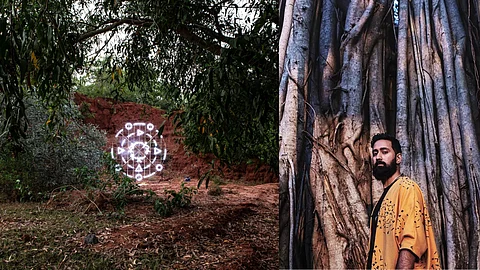
- HOMEGROWN WORLD
- #HGCREATORS
- #HGEXPLORE
- #HGVOICES
- #HGSHOP
- CAREERS
- ABOUT US
- CONTACT US

A muggy, overcast sky in 2016 disbursed summer rain upon a 550 metric tonne ship anchored at the Trinity Buoy Wharf in East London but the free jazz improv session raged unhindered for more than an hour and a half within the sonorous belly of its nautical studio. Among the artists jamming were Chicago house explorer Hieroglyphic Being aka Jamal Moss, British saxophonist Shabaka Hutchings and Indian drummer Sarathy Korwar in astral communion, coupling industrial textures and genre-defying electronica into symphonic transcendence.
A sinuous fluidity deep-rooted in Latin-adjacent percussion, swivel-eyed Afro-cubist rhythms and a good measure of post-bop's controlled freedom, can be found thrumming under the surface for all these artists and the politically' charged dirges they siphon off into the universe. Korwar's fourth album Kalak looms in focus as an Indo-futurist outlier, decolonising the utopian visions that have haunted his contemporaries too, running sylvan fingers through the tresses of jazz itself and dispelling the parasites of Eurocentric predominance. Girdling the cyclical nature of history, where 'yesterday' and 'tomorrow' are indistinguishable in the Hindi-Urdu kal, Korwar's made-up palindrome of a title compels us to remember that the concept of time across different cultures has not always been linear.
"Heat a non-stick pan with the past, add 10 grams of dry privilege seeds," so commences A Recipe To Cure Historical Amnesia, the speculative spoken word poem that primes the listener for a sonic voyage through the institutionalised whitewashing of settler reality. Whether it be a grandmother's cautionary tale or the family's secret sauce heirloom, the artist exhorts you to heed your ancestors and their incessant hymns carving an intergenerational mould for your identity.
An atmospheric sound design by American DJ Photay intertwining Korwar's recurring tabla motifs with Tamar Osborn’s quizzical flutistry in To Remember bleeds irrevocably into the keystone track of Utopia Is A Colonial Project, which sounds like a soul sister to the ecstatic combustion of Shabaka Hutchings' 11-track opus Black To The Future.
In Remember Begum Rokheya, amid the cornucopia of handclaps and reverberating trumpets, the artist revives a 1905 Bengali science fiction story published in The Indian Ladies' Magazine by Rokeya Sakhawat Hossain. Deciding who gets to envision our parallel universe is a way of reclaiming agency over the concept of 'utopia', divorcing it from the white saviour complex, and embedding it within a more palatable narrative of sociological evolution. Like Greta Gerwig's Barbie, the mythical community of Ladyland in Sultana's Dream by Rokeya was "free from sin and harm", heteronormativity and patriarchal domination locked up in the cellars.
Beguiling drumbeats from Japanese taiko ensemble Kodō in That Clocks Don’t Tell But Make Time and the persistent synth waves washing over Remember To Look Out For The Signs christen a departure from our Westward-gazing cultural zeitgeist. With a distinctive blend of jazz, electronic, and Indian classical elements, Korwar admonishes the descendants of a proud civilisation to not be reduced to "charred, unrecognisable versions of their former selves".
